Easy DIY Picture Frame
No complicated cuts here! These attractive DIY picture frames are easy for anyone to make with inexpensive wood, some basic tools, and only 8 straight cuts.
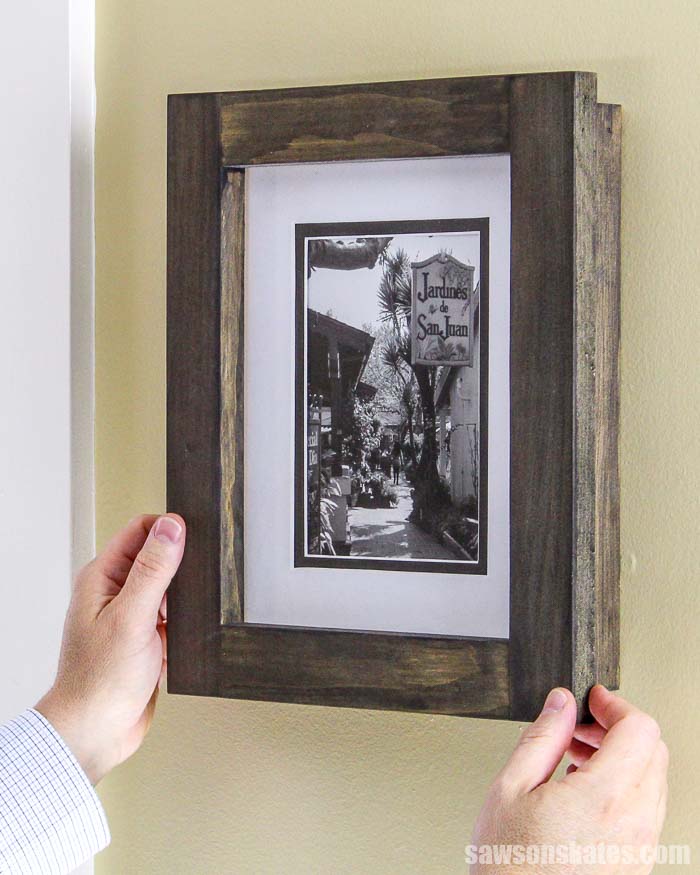
DIY Picture Frames
Store-bought frames can be expensive. Save money and make your own DIY picture frames with these free plans. Forget about those complicated cuts. These frames are an easy afternoon project, made with basic woodworking tools and only eight straight cuts.
Originally published June 12, 2015 updated September 3, 2019
This tutorial contains affiliate links to supplies and tools. Purchases made using these links help support the Saws on Skates website and allows me to share more projects and tips with you. There is no cost to you for using these links. Visit my site policies for more information.
Before we get into how to make custom size DIY picture frames, be sure to click the subscribe button at the bottom of this page to sign up for my FREE weekly newsletter loaded with helpful pocket hole tricks, space-saving workshop ideas, clever DIY tips and more!
Table of Contents
- These DIY Picture Frames are Easy to Make
- What Tools Do You Need to Make DIY Picture Frames?
- Make These DIY Picture Frames Any Size You Need
- Quick Tips for Sizing DIY Pictures Frames
- How to Measure for Custom Size Artwork
- Helpful Tips for Making DIY Picture Frames
- How to Make DIY Picture Frames
- Get the Free Printed Plan >
- More Like This
These DIY Picture Frames are Easy to Make
Have you ever seen the price of store-bought picture frames? They’re so expensive! Today, I’m sharing an easy way to make your own DIY picture frames.
And don’t worry. You don’t need to make any complicated angle cuts. These wood picture frames are made with only eight straight cuts!
These frames can be assembled quickly so they’re an easy afternoon project, making them perfect for when you need to update your home decor in a hurry. They also make a great gift.
Here’s how the frames are made. There are two main parts. The front piece or face frame is where you see your picture or artwork.
The second part is the glass frame, which attaches to the face frame, housing the glass, photo, or artwork and providing a place to hang the frame.
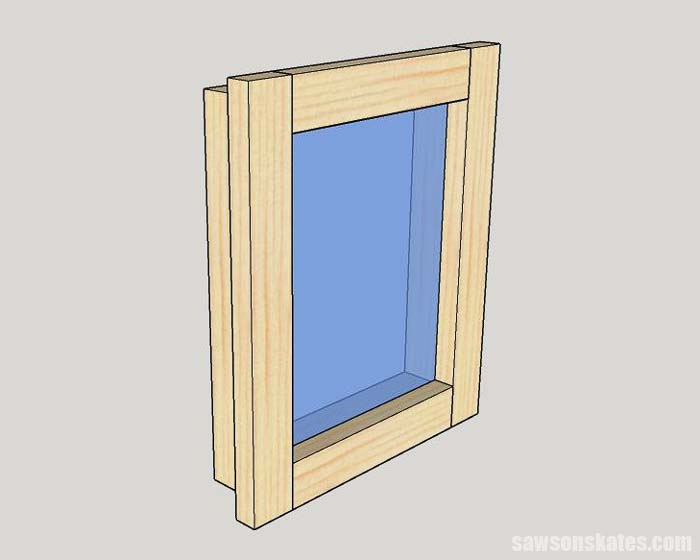
What Tools Do You Need to Make DIY Picture Frames?
These frames can be made with basic woodworking tools that you may already have in your workshop. The eight straight cuts can be made with an inexpensive miter box and hand saw or a power miter saw.
Related: 7 Miter Saw Tricks Every DIYer Should Know
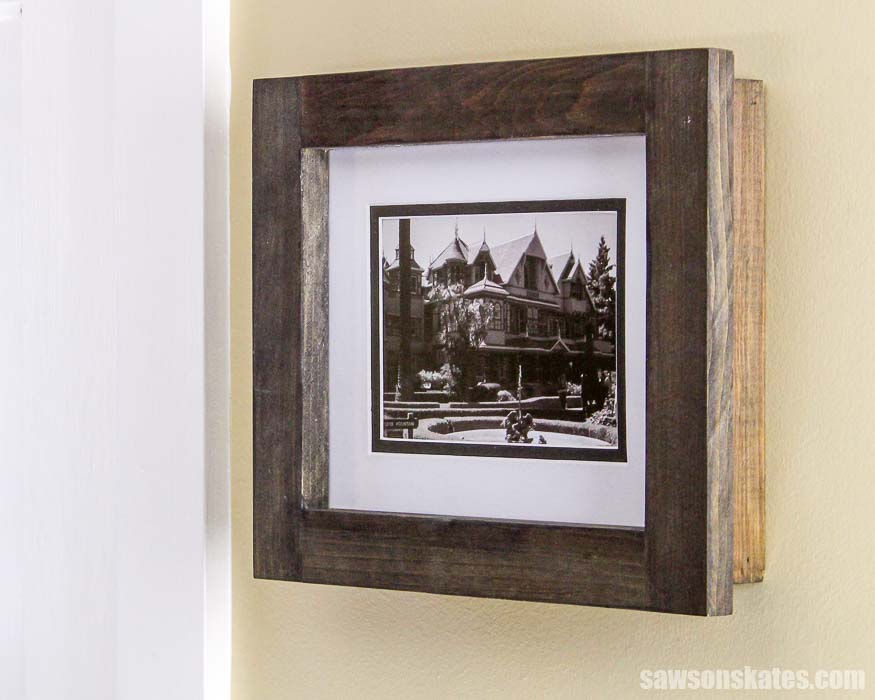
The face frame and glass frame are assembled with a Kreg Jig. A Kreg Jig or pocket hole jig is an easy way for DIYers to join pieces of wood together.
A Kreg Jig uses a guide block with preset holes to drill angled pocket holes into a workpiece. A pocket screw, specifically designed to be used with pocket holes draws the two workpieces together to form a strong joint.
You can use any pocket hole jig, but this would be the perfect project for the Kreg Jig Mini or Kreg Jig R3. They’re both easy to use and affordable.
Related: How to Use a Kreg Jig Mini and How to Use a Kreg Jig R3
Make These DIY Photo Frames Any Size You Need
Here’s the best part about these wood picture frames. You can customize them for any size you need. The plan I’m sharing today makes an 8×10 frame, but you can increase or decrease the measurements to make standard size frames or custom size frames. This means you can frame almost any piece of artwork, photo or poster.
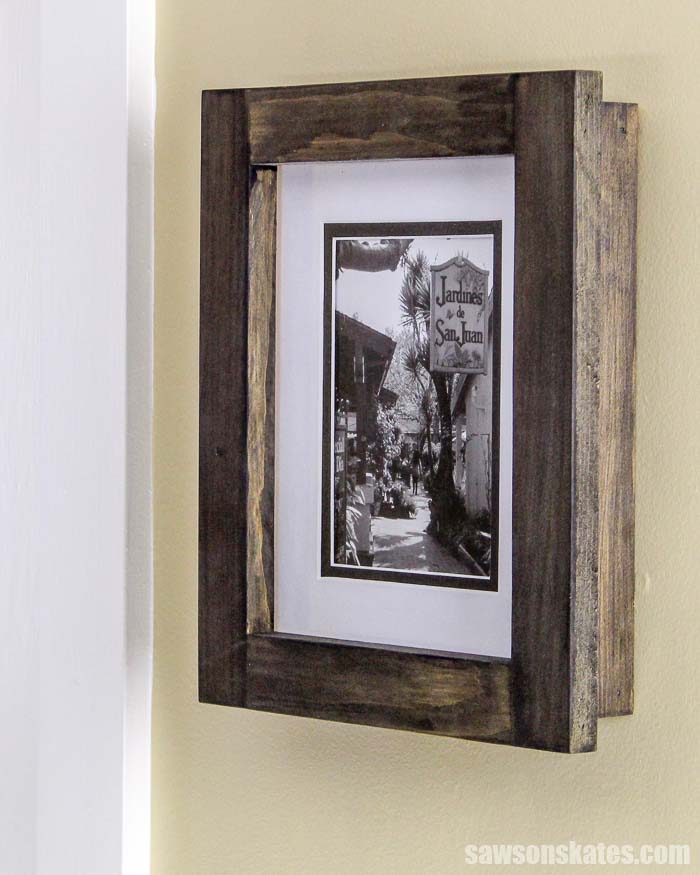
Quick Tips for Sizing DIY Picture Frames
- Measure the photo or artwork and subtract a 1/2″ from the width and height. (ex. 8” × 10” = 7-1/2” × 9-1/2”)
- The top and bottom pieces or rails of the face frame will be cut to the width (7-1/2”).
- The side pieces or stiles of the face frame will be cut 3″ longer than the height (9-1/2” + 3” = 12-1/2”).
- The top and bottom pieces or rails of the glass frame will be cut to the width of the artwork (8”).
- The side pieces or stiles of the glass frame will be cut 1-1/2″ longer than the height of the artwork (11-1/2”)
How to Measure for Custom Size Artwork
The plan I’m sharing makes an 8×10 frame, but you can use the simple guidelines below to build custom frames in any size you need. You’ll start by taking measurements.
Related: How to Use a Tape Measure Correctly (Tips for Success)
In this example, we have a piece of artwork that measures 8 inches x 10 inches.
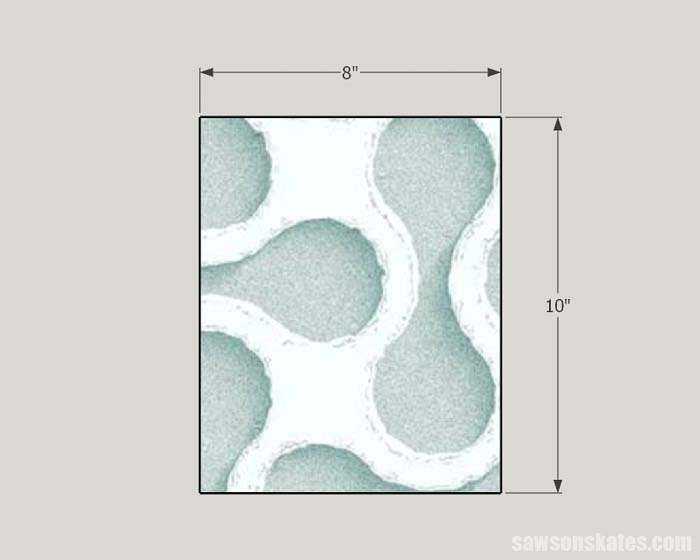
Face Frame
You’ll want to ensure your artwork’s edges aren’t visible when mounted in the frame. So, the frame’s opening should be slightly smaller than your artwork to achieve this.
In this case, subtracting ½ inch from each dimension (7-½” x 9-½”) will provide the appropriate interior dimensions for the frame.
The wood used in this plan is 1×2 lumber, which measures ¾” thick by 1-½” wide. Your frame’s top and bottom horizontal pieces or rails will be cut to 7-½”.
Related: Beginner’s Guide to Wood Sizes
You’ll need to add 3” to your vertical measurement of 9-½” for a total of 12-½”, making the ends of the vertical pieces or stiles meet the outside edges of the rails.
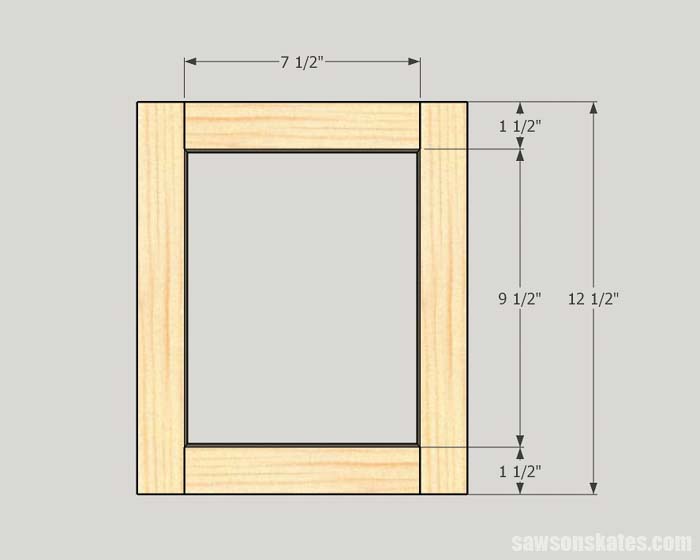
Glass Frame for Standard Sized Artwork
Next, you’ll determine the dimensions for the glass frame, which attaches to the face frame. It houses the glass and the photo and features a large lip that serves as a convenient hanger for the frame.
Again, you’ll use your artwork’s dimensions (8” × 10”) to determine your glass frame’s size.
IMPORTANT: If you’re using store-bought picture frame glass be sure to measure the glass before building the glass frame. Adjust the measurements of the glass frame if necessary. The glass needs to easily fit in the glass frame opening.
To ensure the glass fits smoothly into the frame without the risk of breaking, allow for ⅛-inch clearance in each direction.
The store-bought glass I used for my frames measured 7-⅞ inches by 9-⅞ inches, so I adjusted the opening to 8 inches by 10 inches.
TIP: Since store-bought picture frame glass can be costly, I bought inexpensive picture frames from a dollar store and removed the glass for my project.
Glass Frame for Custom Sized Artwork
Here’s what I would do if I was building a custom frame. I would build the glass frame so the opening measured 8” × 10” (the size of our artwork). Then, I would have a piece of glass cut to fit the opening. Remember, we need to allow for an 1/8” clearance for the glass. This means I would have a piece of glass cut to 7-7/8” × 9-7/8”.
TIP: Most big box home improvement stores and local hardware stores have a glass cutting department. You can also use plexiglass instead.
Building the Glass Frame
The wood we’ll be using to make the frames are 1×2s. A 1×2 measures 3/4” thick by 1-1/2” wide. The rails or horizontal pieces will be cut to 8”.
The glass frame is slightly different than the face frame. The wood for the glass frame stands on end. In this case, we’ll need to add 1-1/2” to our vertical dimension of 10” for a total of 11-1/2”. Adding 1-1/2” will make the ends of the stiles or vertical pieces meet the outside edges of the rails.
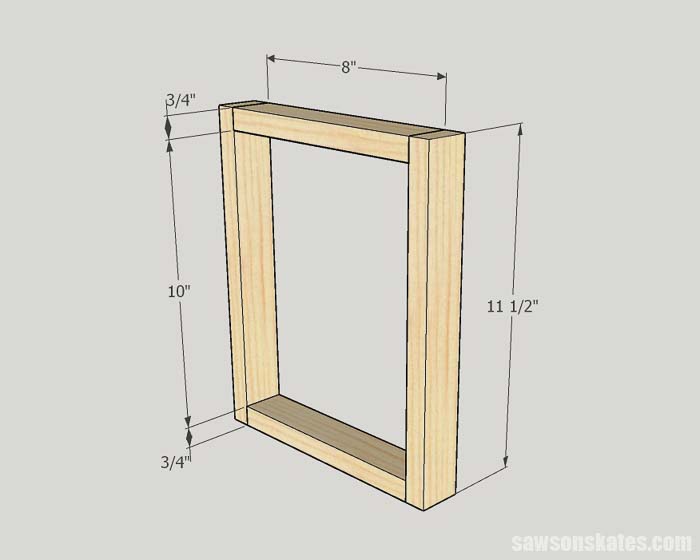
Helpful Tips for Making DIY Wood Picture Frames
- Always cut the top and bottom pieces or rails first. Then, the side pieces or stiles will cover the end grain of the top and bottom pieces. This will give the frames a polished look.
- I used inexpensive common pine for this project. You can give the frames an upscale look by using more expensive wood like maple, oak or cherry.
- You can further customize the look by using a router with a decorative bit on the outside and inside edge of the frame.
- Sometimes it can be difficult to find 1×2s that are straight. In that case, you use a table saw to rip a larger board like a 1×4 to 1-1/2”.
How to Make DIY Picture Frames
Printed Plan
- Get the FREE plan here (includes detailed instructions, measurements, and bonus tips).
Supplies
- Wood (per printed plan – amount will depend on the size of your frame)
- 1-1/4” Pocket Screws
- 2″ #8 Wood Screws
- Wood Glue
- Glass (you can buy frames from the Dollar Store and remove the glass)
- Push Pins (to hold picture and glass in the frame)
Tools
- Tape Measure
- Miter Saw
- Drill
- Pocket Hole Jig
- Bar Clamps
- Countersink Drill Bit
Step 1. Measure the Photo or Artwork
See How to Measure for Custom Size Artwork for more details.
Step 2. Make the Face Frame
Cut two pieces of wood to length for the stiles. Cut two pieces of wood to length for the rails and drill one pocket hole in each end.
Related: How to Use a Pocket Hole Jig
Apply wood glue to the ends of the rails, position on the stiles and clamp. Attach with pocket screws.
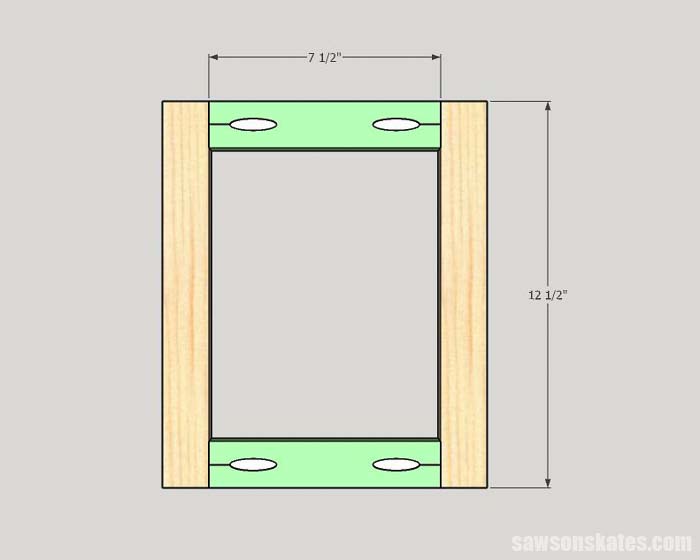
Step 3. Make the Glass Frame
Cut two pieces of wood to length for the stiles. Cut two pieces of wood to length for the rails and drill one pocket hole on each end.
NOTE: Be sure the glass will fit the opening in the glass frame. See How to Measure for Custom Frames for more details.
Apply wood glue to the ends of the rails, position on the stiles and clamp. Attach with pocket screws.
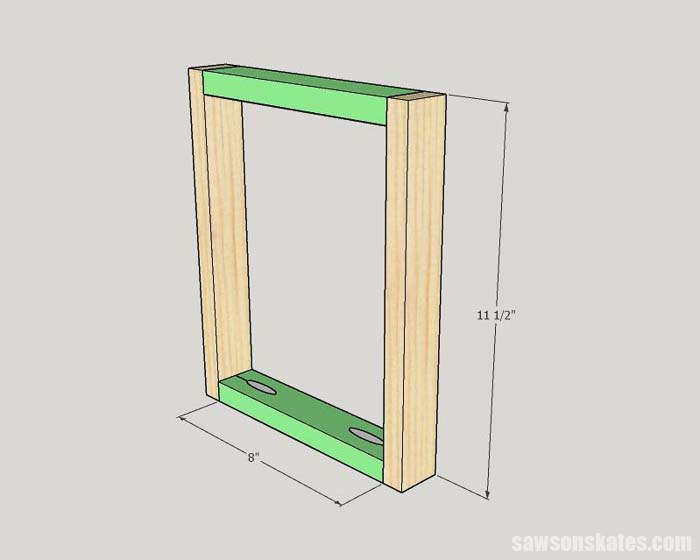
Step 4. Join the Face Frame and Glass Frame
Center the glass frame on the face frame’s opening. Use the diagram to mark the locations for countersink holes. Then, use an awl to make a starting point for the drill bit.
Related: What is an Awl? (and How to Use It)
Drill countersink holes on the back of the glass frame.
Related: How to Use a Countersink Bit
Attach to the face frame using glue and wood screws.
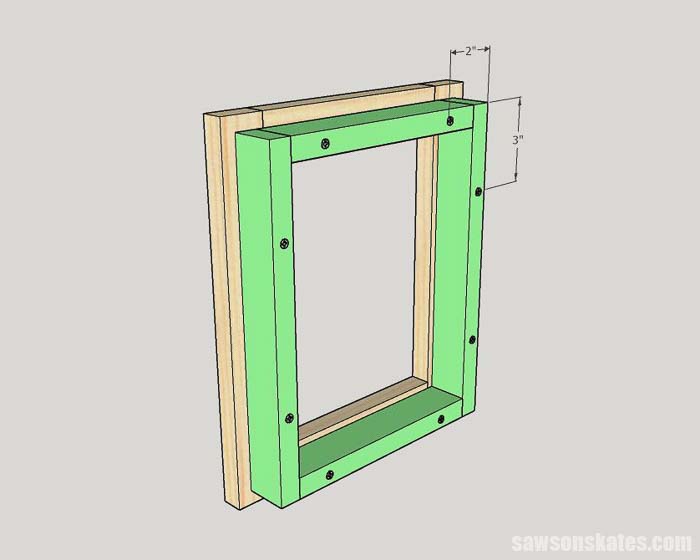
Step 5. Finish the Custom Frame
Sand the frame smooth. Finish with paint, wood stain or leave natural. Cut a piece of cardboard to fit inside the glass frame opening. An Amazon box works great for this. Insert the glass, mat, photo, and cardboard into the glass frame opening.
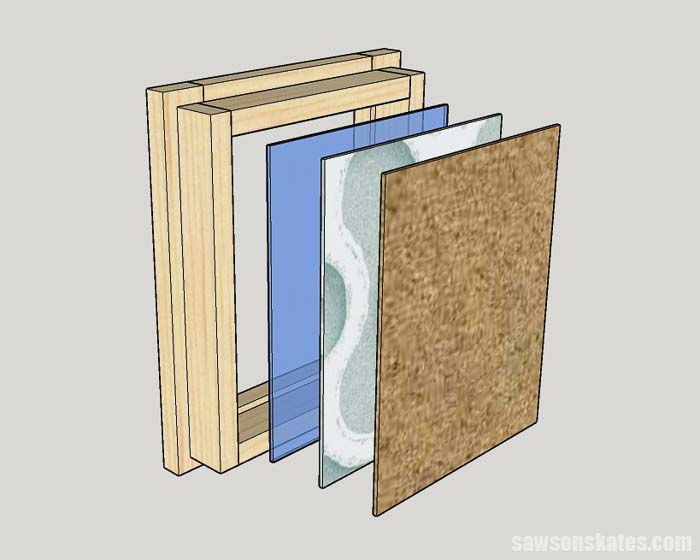
Then, use push pins to hold everything to the back of the frame. Now your wood frame is ready to hang on the wall or give as a gift.
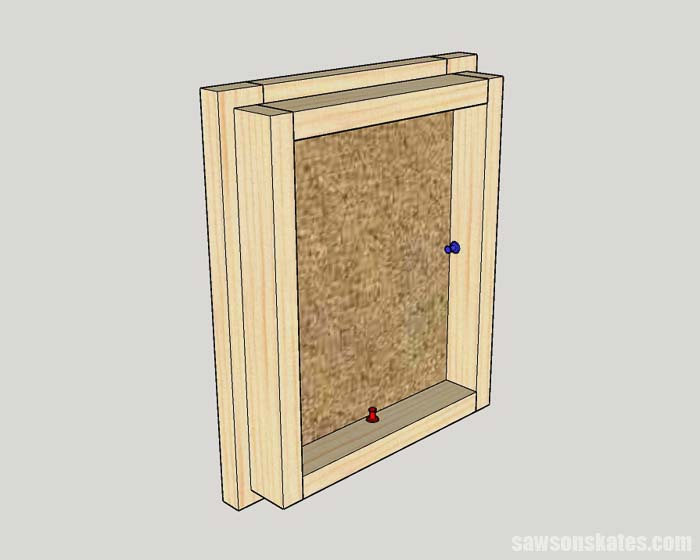
Final Thoughts
Store-bought picture frames can be expensive. Save money and make your own custom wood picture frames with these free plans. These frames are easy to make with a few basic woodworking tools and inexpensive pine boards.
Get the free plan (including the detailed instructions and measurements) now!
Thank you for stopping by. If you found this information helpful, would you please pin it to Pinterest? Other DIYers would appreciate it and I would too! Thank you – Scott

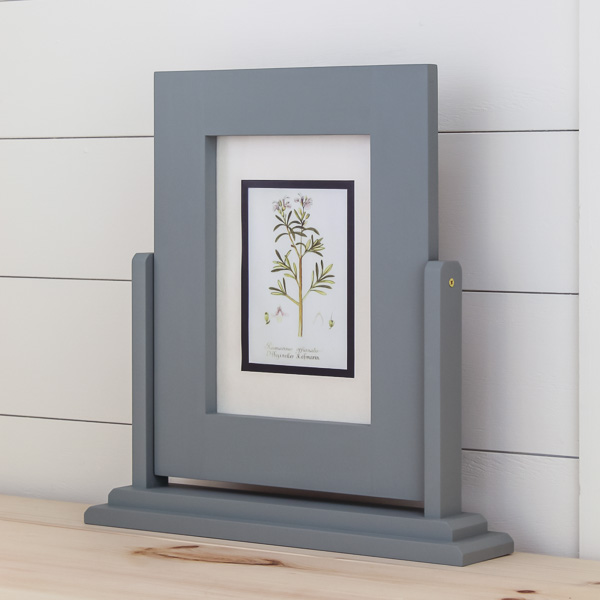
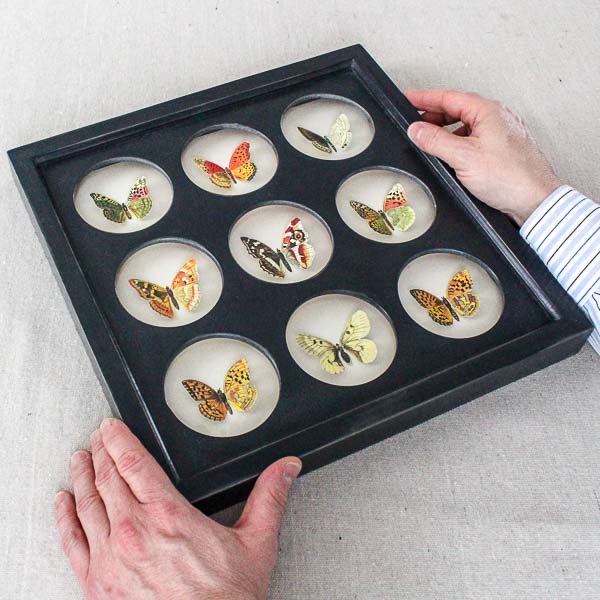
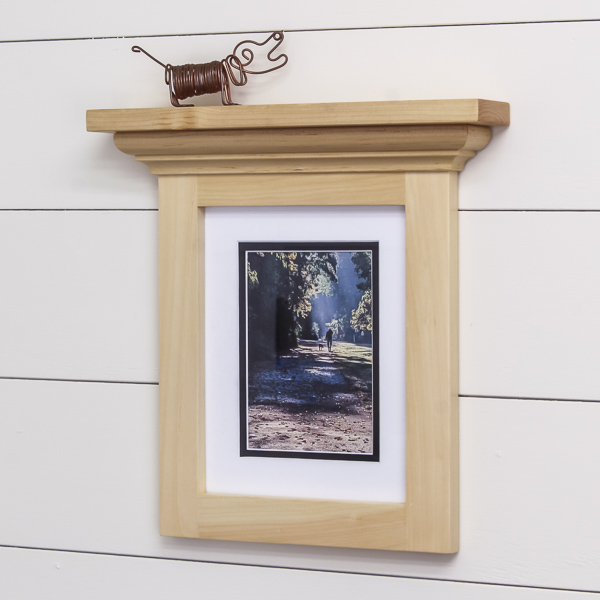
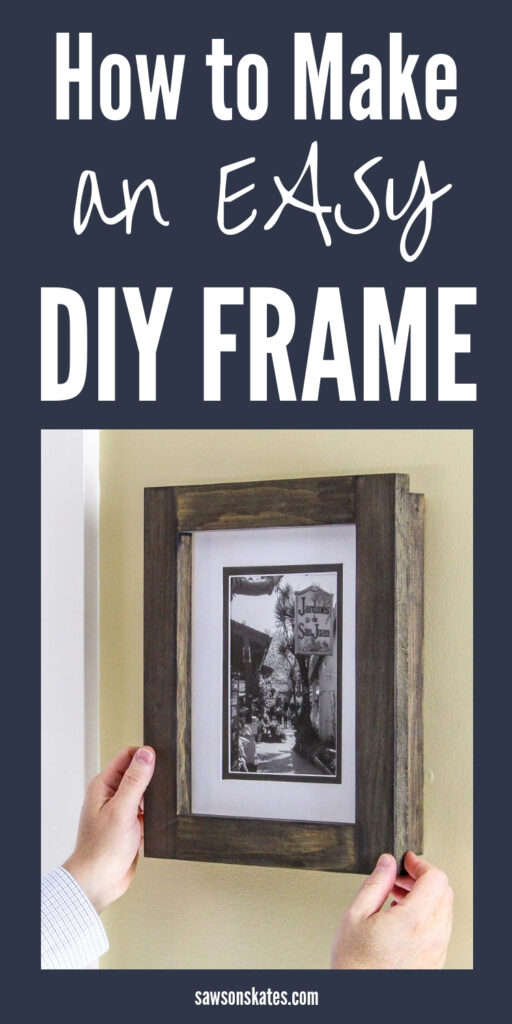
Hi Scott—Instead of using push pins, I like to use window glass glazing points, they are easy to push into soft wood such as pine. A little tougher on hard wood, like oak.
Hi Bob – Glazing points are a great idea! I recommended push pins because I thought people might already have those on hands. But glazing points would be a great choice!
Did you fill in the screw holes before assembly?? I didn’t see any steps that mention that. I’m wanting to try this for a shadow box to display miniatures in. I suppose I could use a filler and paint the inside of the frame to hide it.
Hi Marlene – I didn’t fill the holes because the holes can’t be seen when the frame is hanging on the wall.